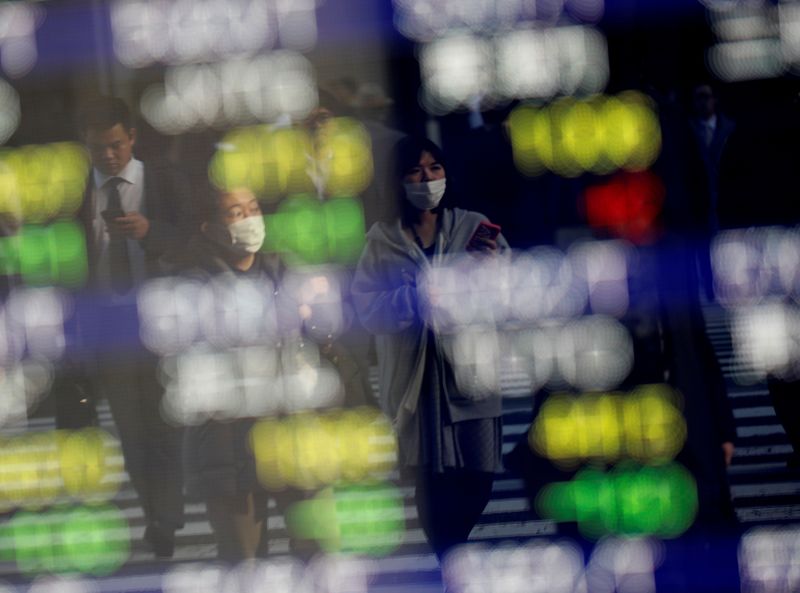By Tommy Wilkes
LONDON (Reuters) - European shares fell on Thursday as lockdowns and rising COVID-19 cases overshadowed the optimism around the rollout of vaccines in the New Year, while the dollar fell to a two-and-a-half-year low.
Trading volumes were thin, with many traders away on New Year's Eve and major European markets closed. Where markets were open, they failed to follow their Asian peers higher.
UK's FTSE 100 fell 1.7% and France's CAC 40 0.4%. U.S. stock futures were 0.15% lower, pointing to a weaker open on Wall Street.
The MSCI World Index was down on the day as gains in Asia gave way to the losses in Europe. The index is headed for a near 14% rise in 2020 after surging more than 60% from its March lows.
Despite a stimulus-charged rebound since the pandemic-induced market slump in March, most European markets have underperformed the United States and Asia, where a series of record highs have been reached.
The pan-European STOXX 600, which was closed on Thursday, recorded a 3.8% drop in 2020 as a rapid surge in coronavirus cases and worries about Brexit curbed improving sentiment.
Still, despite the rising COVID-19 cases and increasing unemployment, investors were betting the rollout of vaccines in 2021 will unleash an economic rebound spurred by plentiful fiscal and monetary cash.
"We still see growth slowing around the turn of the year and the recovery will still face headwinds in the coming quarters, but 2021 is shaping up to be better still than our already strong global outlook—led by a stronger U.S.," JP Morgan economists said in a research note.
Among the biggest developments in markets in 2020 has been the dramatic drop in the dollar. On Thursday, it hit its lowest since April 2018 and is now down 7.2% against a basket of currencies, its worst annual performance since 2017.
The dollar's weakness, driven by bets that the Federal Reserve will keep interest rates very low, has helped rival currencies.
The euro has been a big beneficiary and is up 10% in 2020 and was above $1.23 on Thursday.
ASIAN GAINS
Asian stock gains were led by Chinese blue chips after the announcement of a trade deal with the European Union.
Official data released Thursday also showed activity in China's service and factory sector expanding in December.
Markets barely flickered at the news that China had approved its first COVID-19 vaccine for general public use.
Gary Ng, an economist at Natixis in Hong Kong, said the limited impact on the yuan and Chinese equities showed markets had become immune to this sort of news.
"For the market to react more strongly in 2021, large-scale (vaccine) rollouts with positive outcomes are needed," he said.
Bitcoin's rally paused, rising 0.3% to just under $29,000. The world's largest cryptocurrency has almost quadrupled in value this year amid heightened interest from bigger investors.
Oil prices retreated as swelling year-on-year supply led some traders to view any economic recovery ahead to be gradual rather than swift.
U.S. West Texas Intermediate crude shed 0.48% to trade at $48.17 a barrel, far below about $62 at the start of 2020, and Brent was trading down 0.54%, at $51.35. [O/R]

Gold was little changed at $1,892 an ounce. It has risen 24% this year, its best showing since 2010, as investors looked to safe havens, protection against inflation and as the dollar wilted. Treasuries were little changed, with benchmark U.S. 10-year yields at 0.9264% and two-year yields at 0.123%.